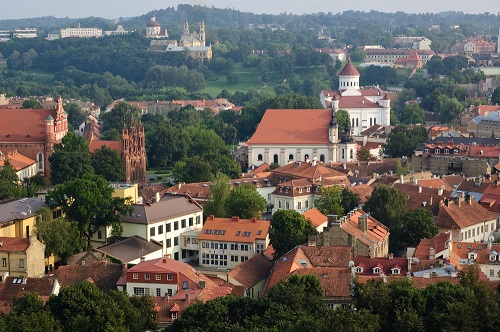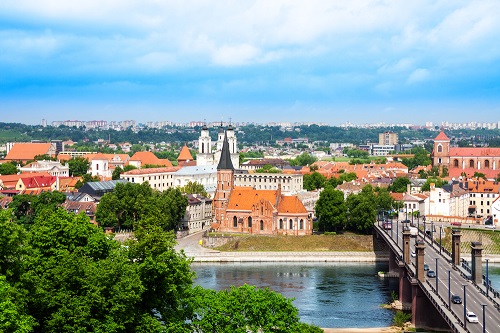Lithuania has a two-tier health insurance system, comprising both public coverage and private providers. The public system is organised by the Compulsory Health Insurance Fund (CHIF) or Valstybinė ligonių kasa, which operates on a principle of universal coverage. It is funded from mandatory health insurance contributions, deducted from your salary, and from the state.
The state health insurance system covers maternity care, but most expats also opt for private cover, and you may prefer to seek your maternity care in the private sector. We will look at some of your options below.
How to decide on a birth plan
A birth plan is a list of what you would like to have happen during labour and afterwards. It is written so that your doctor knows what your wishes and expectations are.
- Where do you want to give birth?
- Who do you want to have with you (e.g. your partner)?
- What kind of birth do you want (e.g. vaginal birth or a Caesarian)?
- Do you need any birthing aids?
- Do you want pain relief, and if so, what kind?
- What kind of birthing environment would you prefer?
You will need to address the possibility of a C-section with your doctor and midwife. The rate of C-sections in Lithuania has increased from 9.49% in 1995 to 24.71% in 2010, but it has recently started to decrease again, following efforts to increase normal vaginal delivery rates. Note that if you give birth in the private sector, you will pay more for a C-section than for a normal delivery, since the process is more complex.
You will also need to discuss whether or not you want an epidural. Most mothers in Lithuania do opt for epidurals. Expats have described facilities in the private sector as ‘state of the art’, and you should not have too much difficulty in obtaining suitable pain management.

You will have a range of options in both the public and the private sector, such as the Baltic American Clinic in Vilnius, which is private, and Antakalnio Poliklinika, which is public. Gynecologists in the private sector often also work in the public sector.
Costs in the private sector have been quoted at around €10K for the delivery, but for a normal, low risk delivery, as well as a couple of days in the hospital, you could be looking at less (around €4500).
Maternity care in Lithuania
You will have six weekly check ups at least with your gynaecologist, and you will be registered for ultrasounds and other tests, such as blood tests. Do not be afraid to ask for a tour of your chosen hospital before the birth, if this is something you would like.
Check that your gynaecologist and midwife have understood your wishes and concerns, as not everyone in Lithuania speaks English. For instance, if you do not want to know the sex of the child beforehand, make sure that your doctor understands this.
You should be able to get a free eye check-up and dental check-up as part of your maternity care. However, you may have difficulty finding prenatal classes in English.
Expat mums report that Lithuanian doctors prefer you to present yourself at the hospital as soon as your contractions start, rather than when you are more deeply into labour. You will usually stay in hospital for around three days, depending on your delivery, but you will need to pay more for a private room. Your partner should be allowed to stay with you overnight, and you should have the benefit of the services of a midwife in the days following the birth, while you are still in hospital, if you would like them.
Maternity benefit (Motinystės išmoka) is paid initially to the mother for the duration of their maternity leave. It will be paid for 70 calendar days prior to the birth of the child up until 56 days after the birth. In the event of birth complications or a multiple birth, an allowance is paid for an extra 14 calendar days. The benefit is equal to 77.58% of earnings.
Note that you can also get a doctor’s sick note if you are having a difficult pregnancy, such as if you suffer from extreme morning sickness, and need to take time off work.

Paternity benefit (Tėvystės išmoka) is paid to the father for 30 calendar days after the birth of the child. You can choose when to receive your benefit, up until the child is three months old. It is equal to 77.58% of earnings.
A further childcare benefit is paid to one of the parents (adoptive parent) or guardians caring for the child. This is calculated in relation to earnings and depends on the time scale.
A lump sum benefit for pregnant women (vienkartinė išmoka nėščiai moteriai) is payable to those who are not eligible for maternity benefit under the Law on Sickness and Maternity Social Insurance.
Entitlement to all of these benefits extends to all those who are insured against maternity under the social security system and who have a record of social security payments for at least 12 of the previous 24 months.
You should find that many medical personnel in the private sector are English-speaking, but do not count on this in the public healthcare system.
Expats report that Lithuania is a friendly, supportive place to bring up children, and, in Vilnius particularly, there are a lot of resources for children, such as child-friendly cafes. Public daycare tends to be Lithuanian-speaking, but one expat reports that there is an English-speaking daycare facility in Vilnius. There are English schools, in addition to some indoor play areas.
Will the baby be a Lithuanian citizen?
Your baby will not be a Lithuanian citizen unless either you or their father is Lithuanian. You will need to notify Lithuanian institutions of the birth, as this has to be included in the registry of the Republic of Lithuania Civil Registry Office. The birth will be included in the registry, whatever the citizenship of the child.

